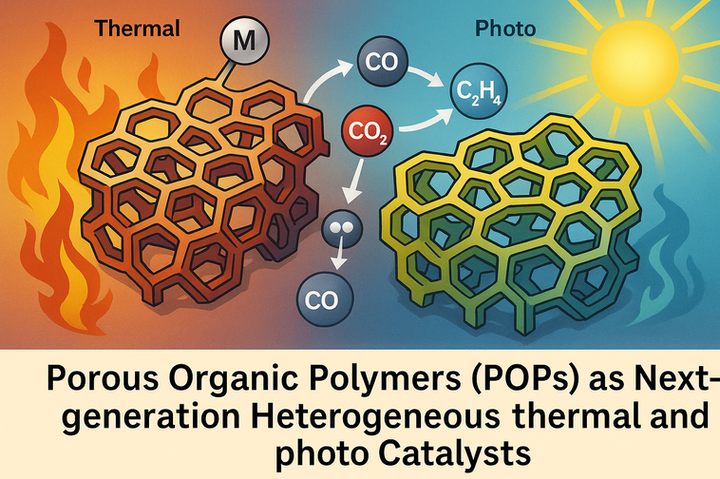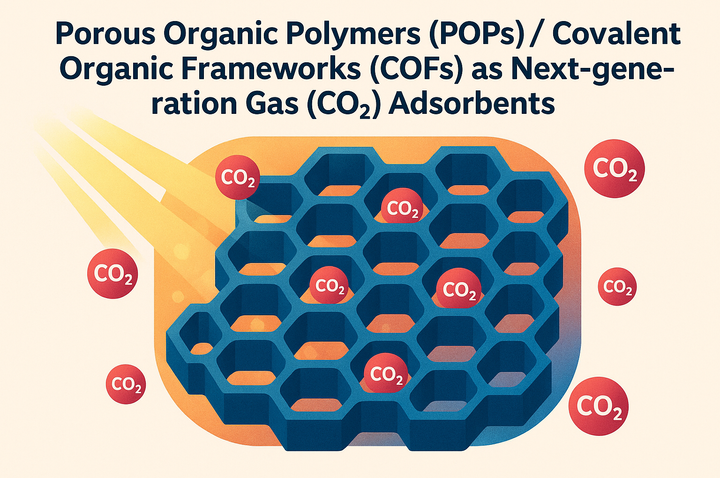Research Interest
-
Design & development of Covalent Organic Frameworks (COFs), Porous Organic Polymers (POPs), and MOF-derived materials.
-
Development of Porous Out-of-Plane Single Atom Catalysts.
-
Thermal hydrogenation & hydrodeoxygenation (HDO) of biomass-derived molecules.
-
Photochemical detoxification of sulfur mustards.
-
Photochemical CO₂ fixation and CO₂ reduction to value-added chemicals.
Teaching Experience
-
Mentored 2 Master’s students at CSIR-IICT
-
Teaching experience in Orientation-cum-Training Programme (6 months) at CSIR-IICT
Conference Attended
-
NANO-SA-2023, ICT Mumbai Marathwada Campus
-
MTIC-XIX, Banaras Hindu University
-
CPIMC-2022, CSIR-IICT
-
FSSM-2020, IIT Kharagpur

Porous Organic Polymer (POPs) as Next-generation Heterogeneous Catalysts
Porous Organic Polymers (POPs) have emerged as promising next-generation heterogeneous catalysts for both thermal and photocatalytic applications. Their tunable porosity, high surface area, and customizable chemical functionality enable precise control over active sites, facilitating efficient interactions with reactants. The covalent backbone of POPs imparts exceptional thermal and chemical stability, making them suitable for demanding catalytic processes. In thermal catalysis, POPs have demonstrated superior performance in reactions such as hydrogenation, oxidation, and dehydrogenation. Meanwhile, their ability to incorporate photoactive units—such as conjugated linkers, chromophores, or metal complexes—positions them as versatile platforms for photocatalytic applications, including CO₂ reduction, organic transformations, and environmental remediation. The modular design of POPs allows for systematic optimization of catalytic performance, opening pathways toward scalable, sustainable catalysis for green chemistry and energy conversion technologies.

Porous Organic Polymer (POPs)/ Covalent Organic Frameworks (COFs) as Next-generation Gas (CO₂) Adsorbents
Porous Organic Polymers (POPs) and Covalent Organic Frameworks (COFs) are emerging as next-generation gas adsorbents, with particular promise for CO₂ capture and storage. Their precisely tunable porosity, ultra-high surface area, and chemically diverse functional groups enable the selective adsorption of CO₂ over other gases. The crystalline and ordered pore channels in COFs provide efficient diffusion pathways and enhance adsorption kinetics, while POPs offer amorphous yet robust frameworks with customizable binding sites for strong CO₂ interactions. Both material platforms exhibit excellent thermal and chemical stability, allowing them to perform under industrially relevant conditions. By engineering pore size, surface polarity, and chemical functionality, researchers can tailor POPs and COFs to achieve high CO₂ uptake, selectivity, and recyclability, positioning them as key materials for addressing challenges in carbon capture, storage, and climate change mitigation.
